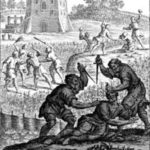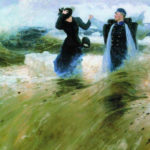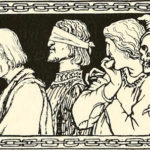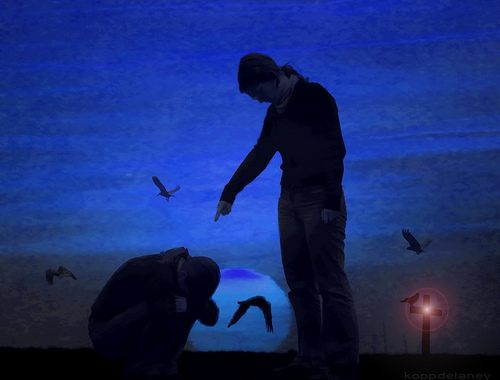We run our website the way we wished the whole internet worked: we provide high quality original content with no ads. We are funded solely by your direct support. Please consider supporting this project.
Becoming Like the Accuser
When the Adam and Eve yielded to Satan and surrendered their God-given authority over the earth and animal kingdom (Gen 3), Satan became “the god of this world” (2 Cor. 4:4), the “ruler of the world” (Jn. 12:32; 14:31) and the “principality and power of the air” (Eph. 2:2) who “has power over the whole world” (1 Jn. 5:19).
Satan is first and foremost a judger. Throughout the Bible we find him bringing judgments against God and humans (The book of Job makes this most clear.) For good reason the Bible labels him “the Accuser” (Rev. 12:10). Not surprisingly, when Adam and Eve opened up their lives to this, they first accepted Satan’s accusation that God is a petty deity who is threatened by their access to the forbidden tree. Once they act on this false picture of God by violating the prohibition, they then judge God to be unmerciful as they hide from him in fear (Gen. 3:8).
When questioned by God, Adam blamed God as well as Eve for his misdeed. “The woman you put here with me – she gave me some fruit from the tree, and I ate it” (Gen. 3:12, emphasis added). Eve in turn also refused to own up to her sin and instead placed all the blame on the serpent (Gen. 3:12).
Though the couple was created to bear God’s image, the Accuser succeeded in getting them to take on something of his image, reflecting his ugly, accusatory character. The couple and all their descendants had become a rebel race of accusers, co-opted into the rebellion of the Powers against the Creator.
Instead of receiving and reflecting God’s life and love toward on another, we now tend to view others through the eyes of our hungry soul and our assumed “knowledge of good and evil.” In our rebellious condition, we tend to “love” those who contribute in some way to our idolatrous sense of fullness of Life—the “good” people—and we tend to despise those we judge to be detracting from our idolatrous sense of fullness of Life—the “bad” people. We judge some as worth loving and others worth hating when we’re under the influence of the Accuser and our stolen “knowledge of good and evil.”
As a result, the human community has become fragmented and filled with violence. The history of humanity has largely been a history of horrific brutality.
Our inability to refrain from violence, despite our remarkable intelligence in some areas and despite our best intentions to avoid it, is arguably the single greatest sign of our subjection to the one whom Jesus says “was a murderer from the beginning” (Jn. 8:44). When people are subjected to the Accuser and filled with judgments, violence is never far away.
The biblical record bears witness to our violent tendencies as a race of accusers. No sooner had the first couple been expelled from the Garden than their first child murdered their second, judging that Abel was in competition with him for God’s approval (Gen 4). As violence always does, this first act of violence set off a chain reaction of violence, to the point that Lamech, a descendent of Cain, boasted that his thirst for vengeance was ten times great than what God had threatened (vs. 24)!
Violence under the reign of the Accuser continued to escalate to the point that, within a couple millennia the world had become so “full of violence” the Lord had to stoop still further and start the whole creation project over again by sending a flood (Gen 6). Had he not done this, all indications are that God’s plan for the human race would have been hopelessly derailed. It was God’s only hope of rescuing the human race from irreversible destruction.
Yet, as drastic as it was, this measure did not put an end to the reign of the destructive Powers. Nor did it reform our fallen accusatory nature. Consequently, sin and violence began to encroach back into the world soon after the flood. Indeed, the rest of the biblical narrative and the whole of human history is one, long, tragic testimony to the truth that, so long as we’re separated from God, we can’t help but separate ourselves from one another. Until we are free from our bondage to the Accuser, we simply can’t stop accusing, which invariably results in some people judging that their enemies don’t deserve to live.
Category: General
Tags: Judgment, Tree of the Knowledge of Good and Evil, Violence
Topics: Following Jesus
Related Reading

Should churches have armed security guards?
Question: Recently (December, 2007) a security guard at New Life Church in Colorado Springs shot and apparently killed a man who was shooting people in the church parking lot. The pastor (Brady Boyd) hailed her as a “real hero.” Do you think churches should have armed security guards and do you think the pastor was…

The Violent Vineyard Owner: A Response to Paul Copan (#8)
In my previous post I addressed two of the three parables that Paul Copan argues present God in violent ways. Today I will address the third, which is the parable of a vineyard owner with hostile tenants (Matthew 21:33-41; Luke 20:9-13). This parable differs from the previous two parables. Whereas the previous parables deal with…

What’s so Wrong About Knowledge of Good and Evil? (podcast)
Greg goes deep, Dan pushes back. Hold on to your notebooks! Episode 514 http://traffic.libsyn.com/askgregboyd/Episode_0514.mp3

Is Islam Inherently Violent? – Further Thoughts
Greg originally posted some thoughts on Islam here. In this video, he discusses some responses he received, and further thoughts on a Kingdom posture toward Muslims.

Sending Evil Spirits
In several infamous biblical depictions of Yahweh in the Old Testament, God is depicted as “sending” spirits to trouble and/or deceive people (Judg 9:22-3; 1 Sam 16:14, 23; 18:10; 19:9; 1 Kg 22:20-3). While there are several exegetical considerations that arguably help alleviate the problematic way these passages implicate God in unethical behavior, I nevertheless…

What Kind of Sinners Feel Welcomed by Your Church?
Perhaps the greatest indictment on evangelical churches today is that they are not generally known as refuge houses for sinners—places where hurting, wounded, sinful people can run and find love that does not question, an understanding that does not judge, and an acceptance that knows no conditions. To be sure, evangelical churches are usually refuge…

